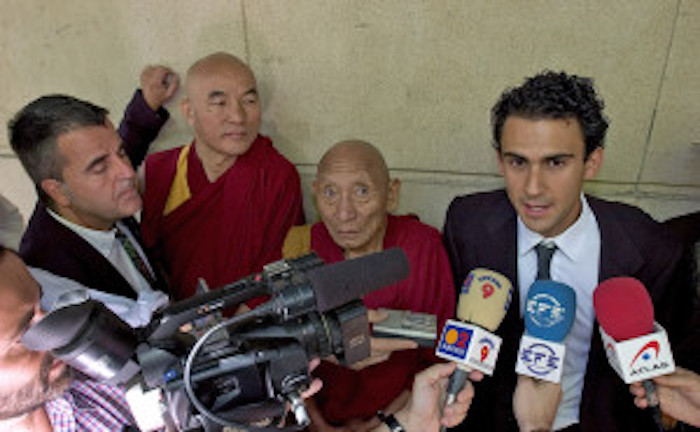Chinese pressures leading towards further impunity. Last Stop: European Court of Human Rights
By José Elías Esteve Moltó, Author and investigative lawyer of the Tibet cases, Professor of International Law at the University of Valencia and Alan Cantos, Director of CAT-Comité de Apoyo al Tíbet, main plaintiff and coordinator of the Tíbet cases*
Since the Pinochet case, the Spanish courts have had a leading role in prosecuting international crimes. The absolute scope of universal jurisdiction culminated with the international arrest warrants issued against various authorities of the Chinese Communist Party for the alleged commission of genocide, torture, crimes against humanity, State Terrorism and other international crimes against the Tibetan people.
Soon after, the Spanish Government under pressure from the Chinese Government proceeded to a new revision of the Organic Law of Judiciary Power, proposing radical amendments and further restrictions to universal jurisdiction. Some of the new requirements of the Organic Law 1/2014 could be contrary to the Spanish Constitution and a myriad of international conventions ratified by Spain (especially the 1949 Geneva Conventions), all of which was denounced to the Constitutional Court.
Meanwhile, different judges have interpreted and applied the new bill with contradictory results. Nonetheless, the prevailing criteria of the Supreme Court which in sentence 296/2015 of 6 May 2015 interpreted universal jurisdiction in a restrictive manner have provoked a domino effect in Spain in the definitive shelving of almost all sensitive international cases.
A third Constitutional Court ruling, rejects with identical arguments, the appeals of the Tibet case plaintiffs, as it did weeks before with the appeals of the Falun Gong case and that of the Socialist Parliamentary Group against the reform of the Law of Universal Justice, under pressure from the Chinese Government.
The ruling that was formally communicated to the Comité de Apoyo al Tíbet (CAT) as chief plaintiff, the Fundación Casa del Tíbet as co-plaintiff, and Thubten Wangchen as private accusation. It is dated 25 February 2019 and rejects the appeal in 28 pages.
The Constitutional Court ruling that has now buried the Tibet case in the Spanish courts had been expected since late December. Indeed, the Court’s ruling on 20 December 2018 declaring that Rajoy’s Conservative Government’s reform of universal jurisdiction did not violate the Constitution, only portended the subsequent debacle. The Constitutional Court judges rejected the appeal of unconstitutionality lodged by the Socialist MPs. Even so, and despite acknowledging the change of interpretive criteria for universal justice since the 2005 ruling on the Guatemala case, and the fact that the 2014 legal reform had drastically changed victims’ access to justice, they concluded that the legislative power had the right to bring about this restrictive modification. The fact that popular action has been abolished, international law is not considered to prevail over internal law, proceedings have been retroactively closed, or that this legal reform was motivated by pressure by a foreign country, China, has not prevented this new law being given the go-ahead.
Thus, since late December it was expected that the various cases that had been admitted to the Constitutional Court would be wrapped up irrevocably. The first case to fall was the other one that inconvenienced China, namely, that of the crimes committed against Falun Gong practitioners. And the following month the judges of the Constitutional Court’s Second Court met again, to agree to finally bury the desire for justice of the victims of the Tibetan genocide.
The Spanish Constitutional Court reproduced the same arguments for all cases. In short, genocide, crimes against humanity and war crimes that had been under investigation for years cannot be tried in Spain, as the Chinese Communist Party leaders accused did not have Spanish nationality nor resided habitually in Spain. Nor was the fact that there was a Spanish victim – the plaintiff Thubten Wangchen – a motive for continuing with the lawsuit because at the time when he suffered persecution at the hands of the Chinese authorities he had not yet acquired Spanish nationality. Similarly, the ruling considers that closing the case retroactively does not constitute denying the victims access to justice, as the mere fact that they were able to appeal to the Constitutional Court implies the exact opposite.
It is not just with Tibet; the Constitutional Court’s three consecutive rulings confirm the definitive end to universal justice in Spain and, specifically, to the cases against the Chinese Community Party leaders, the Tibet case and the Falun Gong case. The timing of these rulings does not go unnoticed after over four years waiting for a reply. But also ditched are the victims of the Couso case, the Ashraf refugee camp in Irak, Guantánamo, the CIA flights, the Palestine Freedom Flotilla, and those of SS members in Nazi extermination camps.
Despite this huge obstacle and political interference, and even though the future gives little cause for optimism, there is still one last possibility outside Spain that the CAT will attempt until the bitter end, namely, going to the European Court of Human Rights in the next few months. Similarly, the new Spanish Government to be formed in the next months with Pedro Sánchez as President has a better chance to restore and extend our crippled law of Universal Jurisdiction.
It is of the utmost importance that this truth and reality of political and judicial interference is known and that together we denounce and stand in front of it.
Read the 18-page commentary by José Elías Esteve Moltó, Author and investigative lawyer of the Tibet cases, Professor of International Law at the University of Valencia.

